- Home
- Anthony Ryan
The Wolf's Call Page 18
The Wolf's Call Read online
Page 18
The uncertainty in her voice made Vaelin pause in mid-stroke. Standing, he turned his gaze to the prow, ignoring Crab’s barked command to stick at it. He could see a very large shape resolving through the mist a few hundred yards away. It was indeed more a ship than a boat. Water swelled before a dark hull as it cut through the lake, a dozen oars on either side propelling it forward. Instead of one sail it had three, the foremost emblazoned in white with a symbol Vaelin had last seen when Ambassador Kohn presented his credentials: the seal of the Merchant King Lian Sha.
He could see a dense knot of men on the huge boat’s foredeck, clad in red and standing with bows raised and drawn. As he watched, the archers all loosed as one and a cloud of arrows rose, arcing high before plunging down onto the two outlaw craft. The lake surface turned white as the arrows fell, covering both boats in a thicket of shafts that surely left no outlaw alive.
“Heaven shits on me once more!” Crab cursed, hauling hard on the tiller whilst tugging on the rope that controlled the sail. The boat duly heaved to starboard, wallowing for a moment before settling. “Get back on your oar,” the boatman instructed Vaelin curtly. “If we can get to shore in time . . .” His voice faded and his eyes grew large as they alighted on something to the west. Vaelin turned to see three more boats emerging from the haze. They were smaller than the first but well crewed by oarsmen and all bearing the same symbol on their sails. It was obvious they were moving far too swiftly to allow any escape.
Crab’s hand slipped from the tiller and he exchanged a sour glance with Chien. “Black knot?”
She nodded, lips twitching in an expression somewhere between a smile and a grimace. “The rule is clear,” she said, her voice betraying only a slight note of apology.
“If I haven’t said it before,” the boatman began, “I’ve always found your company singularly unpleasant . . .”
Chien’s staff divided with a snick, and the blade flicked across his throat. Crab sank to his knees, gurgling as blood flowed freely from the gaping wound beneath his chin. He fell face-first to the deck and lay still after a few shuddering spasms.
“You they might spare,” Chien said, turning to Vaelin. She jerked her head at where Ahn-Jin crouched, clutching her terrified children. “Tell them these were our captives and they might spare them too.”
Taking a deep breath she reversed the grip on her blade, placing the tip just below her sternum, teeth clenched in anticipation of the thrust. Vaelin lashed out before she could drive the blade home, striking just below her nose with his fore-knuckles. Her head snapped back and she staggered, rapidly dimming eyes finding the strength to regard him with a glare of pure hatred before she slipped senseless to the deck.
“Now what?” Nortah asked, breaking the silence that followed.
Vaelin raised a questioning eyebrow at Erlin, who offered a weak smile in return. “We allied ourselves with outlaws,” he said. “We also gave succour to smugglers and travelled the Merchant King’s domain without licence. All offences punishable by death.”
Vaelin looked at the rapidly approaching ship-sized boat, drawing closer by the second with every sweep of its many oars. It was close enough now for him to note that the archers on the foredeck all had arrows nocked to their bows, although he took a morsel of comfort from the fact that they hadn’t yet raised them.
“Put your weapons down,” he told the others, unbuckling his own sword and letting it fall to the deck. Climbing up onto the roof, he gave a precisely measured bow to the oncoming vessel, head lowered by three inches and chest only fractionally forward, hands raised level with his waist, held open and out to the sides. It was a bow Erlin had taught him on the Sea Wasp, insurance against a circumstance such as this; the greeting of a noble emissary to the court of the Merchant King. His uncertainty as to its effect was not enhanced by the spontaneous ripple of laughter that came from the assembled archers on the foredeck.
“I’d guess that’s not a good sign,” Nortah muttered before the prow of the Merchant King’s craft slammed hard into the hull, sending them all sprawling.
PART II
Fear the man with a spear more than you fear the man with a sword.
Fear the man on a horse more than you fear the man with a spear.
Fear the man with a crossbow more than you fear the man on a horse.
Most of all, fear the old woman who comes with a knife as you lie bleeding at the battle’s end, for she fears you not at all.
—SOLDIER’S PROVERB, EMERALD EMPIRE, C. EARLY THIRD CENTURY OF THE DIVINE DYNASTY
LURALYN’S ACCOUNT
The Second Question
Having read several accounts of my brother’s life from those who flatter themselves with the title “historian,” I find myself struck by how often they employ the phrases “reign of terror” and “path of destruction,” particularly in relation to the commencement of his conquests. Whilst I emphatically reject any suggestion that I would ever style myself as my brother’s apologist, it is my intention to provide an honest account in these pages. Therefore, it is my duty to relate that the first steps of Kehlbrand Reyerik on the road to godhood were neither terrible nor destructive. Throughout history many conquerors have built their power through a combination of military might and subsequent subjugation of a cowed and fearful populace. Others, like my brother and the fabled Fire Queen of the Barbarous East, are wiser, for they knew that, for power to endure, the conquered must be given reason to love their conqueror.
Kehlbrand’s ascension to Skeltir of the Cova had been followed by a year-long period of consolidation. Rivals were summarily dealt with through a measured employment of battle or personal challenge. Alliances with many of the other Skeld were secured through marriage, Kehlbrand taking four daughters of fellow Skeltir to wife and marrying off his half sisters and cousins to various sons and Stahlhast luminaries. By the time he was called to the Great Tor to answer the Second Question, he was without doubt the most powerful Skeltir who had ever lived, although full dominance had not yet been achieved.
This time there was no drama when the Mestra-Dirhmar made his pronouncement, although I once again detected a distinct reluctance in the old man’s demeanour. Also, I noted how the assembled lesser priests all turned their back and walked swiftly away at the completion of the proclamation, once again confirming the success of Kehlbrand’s second step towards recognition as Mestra-Skeltir.
The Mestra-Dirhmar lingered for a brief second before following his brethren into the confines of the Great Tor and I managed to catch his softly spoken words to my brother. “Abandon this path, Kehlbrand Reyerik. We both know the third question will be beyond you. You love yourself far too much to answer it.”
Other Skeltir would have bridled at the insult but Kehlbrand just laughed. “No, you venal fool. I love myself far too much not to.”
“What was it?” I asked him as we rode back to our encampment. Whilst he had shared a great deal with me regarding what our brother had told him, much still remained hidden. “What was the second question?”
“It was a simple thing really,” he said. “He asked me, ‘What is a god?’”
“And the reply?”
“All in good time, little colt.” He laughed and spurred his horse to a gallop. “All in good time.”
Kehlbrand’s masterstroke in securing eventual dominance of the Hast came the following spring when he persuaded the other Skeltir to cede to him control of their tors. Kehlbrand had long understood that the true wealth of the Stahlhast has always resided in the tors from where we source our iron and smelt our steel. Each tor had its own cluster of hovels and workshops where the slaves laboured to craft the metal into weapons and armour, whilst others are set to work in the pens where we breed the finest horses in the world. Such labour has long been considered beneath the dignity of those born to the Hast. In fact, the raids we launched into the southlands were often driven by the need to replenish the
enslaved workforce who had a tendency to perish after barely a dozen years of productive use. The whole enterprise was undoubtedly effective in producing steel of good quality, but it was also massively inefficient.
“Every season you must leave half your warriors behind to guard your tors and whip your slaves,” Kehlbrand explained to the assembled Skeltir. “If we are ever to sweep to the Golden Sea, this must change. Place your tors in my hands. They will still belong to you, all the slaves and steel will be yours, but I will oversee them, and the rewards will be great.”
“But who will guard them?” the Skeltir enquired. “And who will whip the slaves?”
“Soon the Stahlhast will be one,” Kehlbrand replied. “And Skeld will not steal from other Skeld. As for the slaves . . .” He paused then and I remember a small smile playing across his lips as he lowered his head, muttering something in the language of the southlands, a tongue unknown to all present save me. “What god need whip his supplicants?” The smile disappeared as he raised his head once more, face forming the purposeful glower expected of a Skeltir as he replied, “They will come to fear the merest glance of the Darkblade far more than the kiss of your lash.”
There were objections, of course, voices raised in condemnation of one who would undo centuries of tradition, one who would lead us away from the path set down by the Unseen countless years ago. This obliged Kehlbrand to engage in another brief round of battle and challenge, and within the space of another year the tors were in his grasp.
“What do you see, little colt?” he enquired as we toured the hovels clustered around one of the largest tors in the Iron Steppe. It had been named the Fist of the Unseen by some long-forgotten ancestor, and generations of Stahlhast had fought to possess it ever since, it being so rich in ore. Until recently the Fist had rested in the hands of the Wohten Skeld, whose Skeltir, a stubborn man with an unfortunate attachment to his name, had chosen death rather than subservience. Tacitly, the Fist remained the property of the Wohten, but any fool could see that only my brother’s will held sway here now.
“I see a den of slaves,” I replied, surveying the ramshackle huts. Filth ran in shallow channels through the narrow streets, and the place stank of smoke and human waste. Most of the inhabitants were at work in either the mines or the pens, the few who remained careful to seclude themselves in their hovels as we passed by. Here and there a body lay in a shadowed corner, stripped of clothing and shrouded by flies. Whilst I would dearly love to claim some welling of compassion at this juncture, the unpalatable truth is that the plight of the slaves had never troubled my thoughts to any great degree. They were not of the Hast, and their bondage and labour were necessities blessed by the priests. It had always been this way.
“I see disease and death,” I added, swallowing and holding bundled silk to my nose. “Also little reason to remain. Unless it’s your desire to watch your sister lose her breakfast.”
“Look closer,” he told me, pausing at one of the huts. Pushing the door aside he revealed a dirt floor and a few meagre possessions: a blanket, an old iron skillet. It took a second before I discerned the two emaciated figures crouched in the unlit recesses of the hut, a woman and a girl. They both had their eyes closed and heads lowered, as was required of their kind when looked upon by their betters.
“What do you see?” Kehlbrand pressed.
I took note of the fierceness of the woman’s grip on the girl, the closeness with which she held her. As my gaze lingered the girl shuddered, a whimper escaping her lips and causing the woman to smooth a hand through her unwashed, greasy hair, lips moving in barely audible words of comfort.
“A mother and child,” I said. “They fear us.”
“And are they right to do so?”
“Of course. A fearless slave is not a slave.”
“True.” Kehlbrand spoke softly to the woman and child in the language of the southlands, it being the most common tongue amongst the slaves: “Pardon our intrusion.”
He closed the door and we resumed our stroll, Kehlbrand leading me towards the workings in the base of the Fist. “Fear is as much a necessary part of what happens here as the slaves’ labour,” he said. “But it is expensive, for the production of fear also requires labour, on our part.”
The hovels soon gave way to the expanse of bare stone that surrounded the tor, revealing the sight of the massed slaves at work. The Fist resembled half of a giant, rotted apple, its flanks eaten away by the quarries where the slaves toiled. Like maggots in the flesh, I thought, surveying the multitude. An exact count of their number was never taken as they died so frequently. The only measure of their worth was in the amount of ore they dug from the rock. When the tally fell, the Wohten would raid to replenish their workforce.
“As you see.” Kehlbrand gestured expansively at the works, from the quarries to the long lines of slaves pushing carts or carrying ore-laden baskets towards the smoke-shrouded buildings where the smiths worked. Warriors were everywhere, several hundred at least, mostly mounted and sitting in silent vigilance. Every few minutes one would turn his mount towards a line of slaves moving fractionally slower than the others. This increased scrutiny was usually sufficient to compel them to greater efforts. If the warrior found their response unacceptable, or succumbed to boredom, they would unhook the long oxhide whip from their saddle. These whips produce a particularly vicious crack as they snake through the air with deceptive slowness. Most warriors were content to leave a bleeding lash mark or two on faces or arms of tardy slaves, whilst others were more inventive.
“That man, for instance.” Kehlbrand pointed to where a warrior had skillfully looped his whip around a slave’s ankle in order to drag him across the stone. The warrior’s features were set in a mask of determined anger rather than cruelty, the face of a man engaged in a bothersome chore. “He would rather be galloping across the Iron Steppe with a falcon on his wrist,” my brother went on. “Or charging lance in hand into the heart of the battle, hungry for renown and the favour of the Unseen. But here he finds no more renown than a common herdsman, and our great mission suffers for it.”
The warrior’s mount came to an abrupt halt as Kehlbrand called out to him, striding across the stone with hand raised. “Mestra-Skeltir,” the warrior said, swiftly dismounting to sink to one knee. The title hadn’t as yet been formally bestowed upon my brother by the priests, but even then it had become commonplace for the Hast to refer to him as such.
Kehlbrand ignored the kneeling warrior, instead moving to the slave and crouching to unfurl the whip from his ankle. “Are you hurt?” he asked in the southland tongue as the man gaped at him in mingled terror and mystification. “Sister!” Kehlbrand called out to me, voice rich in urgent compassion. “Fetch water!”
I did as I was bid without hesitation, accustomed by now to my brother’s liking for unexpected theatrics. Going to a nearby barrel I scooped water into a bucket and carried it to Kehlbrand’s side, watching as he used his hands to convey the liquid to the slave’s mouth. I took in the sight of the raw, bleeding scrapes on his forehead and limbs, deep enough to lay bare the muscle beneath his skin. Such injuries would normally entail a swift execution since they would render him unfit to work for several days.
“Fear not,” Kehlbrand told the slave, spooning more water into his mouth. Rising he called out to the two warriors who had escorted us through the hovels. “Ride to our camp, bring the healer!”
“Healer?” the warrior who had inflicted the punishment asked in evident bafflement. The incident had attracted the attention of several of his fellows and I kept the wariness from my features as we found ourselves in the centre of an encircling ring of riders. They were all Wohten, until recently fierce and hated enemies of the Cova. I could see no aggression in them, however, just a shared depth of incomprehension.
“What was this man’s offence?” Kehlbrand demanded of the dismounted warrior.
“He met my gaze, M
estra. It is death for a slave to look into the eyes of one born to the Hast. So have the priests ordained.”
“Do not speak to me of priests,” Kehlbrand rasped, face reddening. I watched as he made a show of mastering himself, breathing deeply and running a trembling hand through his hair. “This is not your fault,” he said, voice faint as if experiencing a sudden realisation. “Too long have those who stand between the Hast and the Unseen led us along the wrong path.”
My unease deepened as I saw the warriors exchange uncertain glances. Fortunately, Kehlbrand was ever skilled in not allowing the thoughts of his audience to dwell on uncomfortable notions.
“You are needed here no longer,” he told them. “Return to your Skeld. Hunt, practise your skills, teach your young. Tell all, the great ride to the Golden Sea will soon be upon us.”
“But . . .” one of the warriors began, gesturing to the quarries. “The slaves, Mestra-Skeltir.”
“Slaves?” Kehlbrand looked down at the injured man at his feet, his smile as full of warmth as it was of guilt. “There are no slaves here now. Leave this tor and these people to me, for now their labour will be my labour.”
It took a great deal more inventive rhetoric before the warriors of the Wohten tied their bows and lances to their saddles and rode off towards the encampments of their Skeld. By Kehlbrand’s order they each left one weapon behind. The oxhide whips were all piled atop the largest quarry, where he stood to address the assembled slaves. They stood in bedraggled ranks below, staring up at the strange, tall Stahlhast with a voice that seemed to reach every ear with unnatural ease.
“These,” Kehlbrand said, pointing to the piled whips, “will never touch your flesh again. This I swear. Many are the crimes that brought you here and great is my pain at all you have suffered. Know this, today the Darkblade has taken you under his protection and I will cherish you as I cherish my own blood. Henceforth all labour will be rewarded. None will go hungry. Before another pick touches this tor, we will build real houses where families will live in warmth and safety. For now, go and rest. Tomorrow we build, and so that you know my word is true, the Darkblade and his beloved sister will stay and build with you. We will not leave this place until all is made right and all wounds are healed.”

 Raven’s Shadow Book One: Blood Song (Raven's Shadow)
Raven’s Shadow Book One: Blood Song (Raven's Shadow)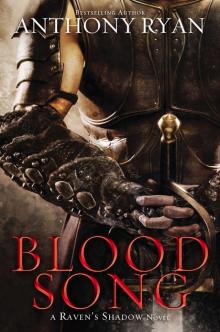 Blood Song
Blood Song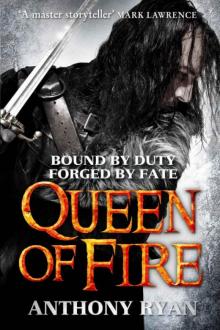 Queen of Fire
Queen of Fire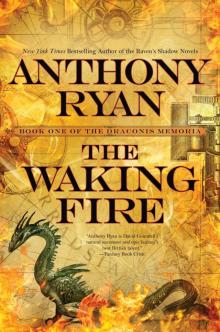 The Waking Fire
The Waking Fire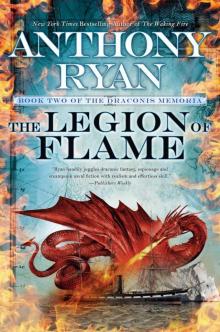 The Legion of Flame
The Legion of Flame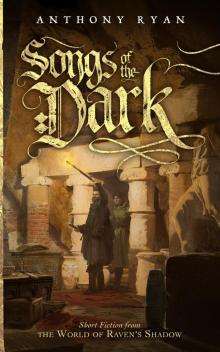 Songs of the Dark
Songs of the Dark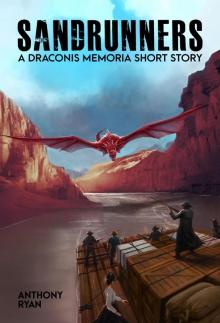 Sandrunners--A Draconis Memoria Short Story
Sandrunners--A Draconis Memoria Short Story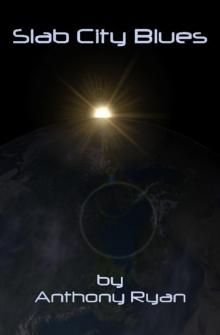 Slab City Blues
Slab City Blues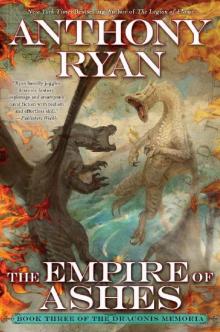 The Empire of Ashes
The Empire of Ashes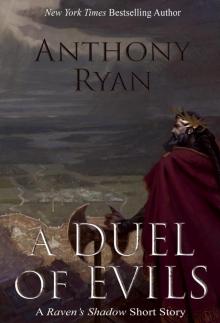 A Duel of Evils
A Duel of Evils The Pariah
The Pariah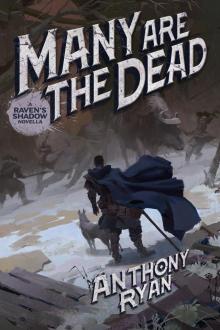 Many Are the Dead
Many Are the Dead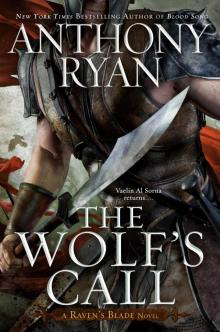 The Wolf's Call
The Wolf's Call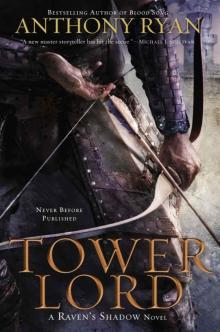 Tower Lord (A Raven's Shadow Novel)
Tower Lord (A Raven's Shadow Novel)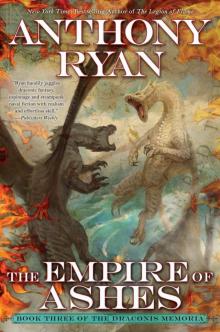 The Empire of Ashes (The Draconis Memoria)
The Empire of Ashes (The Draconis Memoria)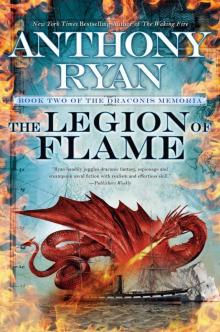 The Legion of Flame (The Draconis Memoria)
The Legion of Flame (The Draconis Memoria)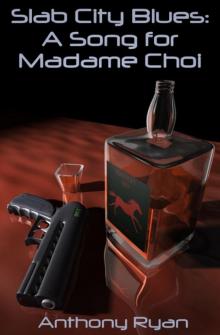 Slab City Blues: A Song for Madame Choi
Slab City Blues: A Song for Madame Choi